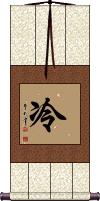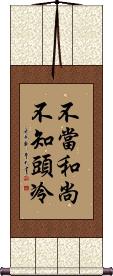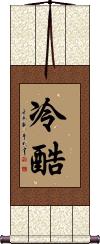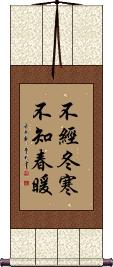Many custom options...
And formats...

Cold in Chinese / Japanese...
Buy a Cold calligraphy wall scroll here!
Personalize your custom “Cold” project by clicking the button next to your favorite “Cold” title below...
1. Cold
2. To Know Hardship, One Must Experience It
4. One frost doesn't make winter
5. You must endure a harsh winter to appreciate the warmth of springtime
Cold
冷 is “cold” in Chinese, Japanese Kanji, and old Korean Hanja.
This can also mean cool, chilled, and unheated.
In Chinese, this can be the surname, Leng.
In Japanese, it can be the given/surname Rei.
冷 is an unusual title for a wall scroll but it's OK if “cold” has a special meaning to you, or your name is Leng or Rei.
To Know Hardship, One Must Experience It
不當和尚不知頭冷 is a Chinese proverb that literally translates as: [One who has] not been a monk [does] not know [the feeling of a] cold head.
I need to explain that a Chinese Buddhist monk always has a shaved head, and thus a cold head in winter.
Figuratively, this means: One cannot know the true meaning of hardship until one has experienced it oneself.
This is an idiom in Chinese, so the figurative meaning is what people perceive when they hear or read this phrase. Just as in English, when someone says, "The grass is always greener," one will think about the idea of jealousy, rather than the quality of one’s lawn.
Relentless / Ruthless
冷酷 means relentless or ruthless in Chinese, and Japanese Kanji.
It can also be translated as grim, unfeeling, callous, cruel, or cold-hearted.
This is a rather negative word. it’s really inappropriate for a wall scroll, so please don’t order this unless you really want to shock Asian people who see it.
One frost doesn't make winter
一次霜凍不代表整個冬天 is a proverb that means “One frost doesn't make winter.”
The deeper meaning is that a single early sign of cold weather doesn't signify the full onset or severity of winter; it's about the gradual transition of seasons, patience, and not jumping to conclusions.
It's a reminder to stay resilient, wait for the real season to arrive, and not let one small event define the whole experience, similar to how one kind word can warm you for months.
While the origin of this proverb is murky (not originally Chinese, likely a modern adaptation of “One swallow does not a summer make”), this idea aligns with the Chinese solar terms (二十四節氣), which mark subtle shifts, like the transition from "cold dew" (寒露) to "frost falls" (霜降).
You must endure a harsh winter to appreciate the warmth of springtime
You must know hardship to appreciate happiness
This literally translates as: Without having experienced the cold of winter, one cannot appreciate the warmth of spring.
Figuratively, this means: One cannot truly appreciate happiness without having gone through hardship.
There are many contrasts in life. One simply cannot fully know what joy is without having experienced misery, difficulty, and pain. How could you explain “light” if you did not have “darkness” to compare it to?
Embrace hardship, as it makes the good times seem even better.
Mountain Travels Poem by Dumu
This poem was written almost 1200 years ago during the Tang dynasty.
It depicts traveling up a place known as Cold Mountain, where some hearty people have built their homes. The traveler is overwhelmed by the beauty of the turning leaves of the maple forest that surrounds him just as night overtakes the day, and darkness prevails. His heart implores him to stop, and take in all of the beauty around him.
First, before you get to the full translation, I must tell you that Chinese poetry is a lot different than what we have in the west. Chinese words simply don't rhyme in the same way that English or other western languages do. Chinese poetry depends on rhythm and a certain beat of repeated numbers of characters.
I have done my best to translate this poem keeping a certain feel of the original poet. But some of the original beauty of the poem in its original Chinese will be lost in translation.
Far away on Cold Mountain, a stone path leads upwards.
Among white clouds, people's homes reside.
Stopping my carriage I must, as to admire the maple forest at nights fall.
In awe of autumn leaves showing more red than even flowers of early spring.
Hopefully, this poem will remind you to stop, and “take it all in” as you travel through life.
The poet's name is “Du Mu” in Chinese that is: ![]()
![]() .
.
The title of the poem, “Mountain Travels” is: ![]()
![]()
You can have the title, poet's name, and even “Tang Dynasty” written as an inscription on your custom wall scroll if you like.
More about the poet:
Dumu lived from 803-852 AD and was a leading Chinese poet during the later part of the Tang dynasty.
He was born in Chang'an, a city in central China and the former capital of the ancient Chinese empire in 221-206 BC. In present-day China, his birthplace is currently known as Xi'an, the home of the Terracotta Soldiers.
He was awarded his Jinshi degree (an exam administered by the emperor's court which leads to becoming an official of the court) at the age of 25 and went on to hold many official positions over the years. However, he never achieved a high rank, apparently because of some disputes between various factions, and his family's criticism of the government. His last post in the court was his appointment to the office of Secretariat Drafter.
During his life, he wrote scores of narrative poems, as well as a commentary on the Art of War and many letters of advice to high officials.
His poems were often very realistic and often depicted everyday life. He wrote poems about everything, from drinking beer in a tavern to weepy poems about lost love.
The thing that strikes you most is the fact even after 1200 years, not much has changed about the beauty of nature, toils, and troubles of love and beer drinking.
This in-stock artwork might be what you are looking for, and ships right away...
Gallery Price: $121.00
Your Price: $66.88
These search terms might be related to Cold:
Arctic Fox
Awesome / Really Cool
Calm / Cool
Calm / Cool-Headed
Chill Out
Fight to the End / Fight Until the Bitter End
Ice / Frost
One Frost Doesn't Make Winter
Winter Season
You Must Endure a Harsh Winter to Appreciate the Warmth of Springtime
Not the results for cold that you were looking for?
Below are some entries from our dictionary that may match your cold search...
| Characters If shown, 2nd row is Simp. Chinese |
Pronunciation Romanization |
Simple Dictionary Definition |
乾 干 see styles |
gān gan1 kan ken けん |
More info & calligraphy: Qianqian (one of the trigrams of the I Ching: heaven, northwest); (surname) Nukui Dry, dried up, clean; heaven, male, masculine, enduring, continual. Translit. gan and h. |
冰 see styles |
bīng bing1 ping hiyou / hiyo ひよう |
More info & calligraphy: Ice / Frost(1) (archaism) ice; (2) hail; (personal name) Hiyou Ice, chaste. |
冷 see styles |
lěng leng3 leng rei / re れい |
More info & calligraphy: Cold(1) (abbreviation) (on floor plans) (See 冷蔵庫) refrigerator; (noun or adjectival noun) (2) (rare) cold; cool; (3) (abbreviation) (rare) (See 冷酒・れいしゅ) cold sake; (surname, given name) Rei Cold. |
水 see styles |
shuǐ shui3 shui yoshimi よしみ |
More info & calligraphy: Water(1) (See 湯・ゆ・1) water (esp. cool or cold); (2) fluid (esp. in an animal tissue); liquid; (3) flood; floodwaters; (4) {sumo} (See 力水) water offered to wrestlers just prior to a bout; (5) {sumo} (See 水入り) break granted to wrestlers engaged in a prolonged bout; (female given name) Yoshimi water; liquid. |
金 see styles |
jīn jin1 chin kin きん |
More info & calligraphy: Gold / Metal(1) gold (metal); (2) (See 金色) gold (color); (3) gold (medal); first place (prize); (noun - becomes adjective with の) (4) something of great value; something golden (e.g. silence); (5) money; gold coin; (6) (written before an amount of money) sum (of money); (7) (abbreviation) (See 金曜) Friday; (n,ctr) (8) karat (measure of purity of gold); carat; (9) (See 五行・1) metal (fourth phase of Wu Xing); (10) (hist) Jin dynasty (of China; 1115-1234); Chin dynasty; Jurchen dynasty; (11) (abbreviation) {shogi} (See 金将) gold general; (12) (abbreviation) (colloquialism) (See 金玉) testicles; (surname) Kimu; Kim hiraṇya, 伊爛拏 which means cold, any precious metal, semen, etc.; or 蘇伐刺 suvarṇa, which means "of a good or beautiful colour", "golden", "yellow", "gold", "a gold coin", etc. The Chinese means metal, gold, money. |
地獄 地狱 see styles |
dì yù di4 yu4 ti yü jigoku じごく |
More info & calligraphy: Hell(1) {Buddh} hell realm; Naraka; (2) {Christn} Hell; (3) hell; misery; nightmare; inferno; (4) place where a volcano or hot springs constantly spew smoke or steam; (place-name) Jigoku naraka, 捺落迦 (or 那落迦) ; niraya 泥犂; explained by 不樂 joyless; 可厭 disgusting, hateful; 苦具, 苦器 means of suffering; if 地獄 earth-prison; 冥府 the shades, or departments of darkness. Earth-prison is generally intp. as hell or the hells; it may also be termed purgatory; one of the six gati or ways of transmigration. The hells are divided into three classes: I. Central, or radical, 根本地獄 consisting of (1) The eight hot hells. These were the original hells of primitive Buddhism, and are supposed to be located umder the southern continent Jambudvīpa 瞻部州, 500 yojanas below the surface. (a) 等活 or 更活 Saṃjīva, rebirth, where after many kinds of suffering a cold wind blows over the soul and returns it to this life as it was before, hence the name 等活. (b) 黑繩 Kaslasūtra, where the sufferer is bound with black chains and chopped or sawn asunder. (c) 線合; 衆合; 堆壓 Saṃghāta, where are multitudes of implements of torture, or the falling of mountains upon the sufferer. (d) 號呌; 呼呼; 叫喚 Raurava, hell of wailing. (e) 大呌; 大號呌; 大呼 Mahāraurava, hell of great wailing. (f) 炎熱; 燒炙 Tapana, hell of fames and burning. (g) 大熱; 大燒炙; 大炎熱 Pratāpana, hell of molten lead. (h) 無間; 河鼻旨; 阿惟越致; 阿毗至; 阿鼻; 阿毗 Avīci, unintermitted suffering, where sinners die and are reborn to suffer without interval. (2) The eight cold hells 八寒地獄. (a) 頞浮陀地獄 Arbuda, where the cold causes blisters. (b) 尼刺部陀 Nirarbuda, colder still causing the blisters to burst. (c) 頞哳吒; 阿吒吒 Atata, where this is the only possible sound from frozen lips. (d) 臛臛婆; 阿波波 Hahava or Apapa, where it is so cold that only this sound can be uttered. (e) 虎虎婆 Hāhādhara or Huhuva, where only this sound can be uttered. (f) 嗢鉢羅; 鬱鉢羅 (or 優鉢羅) Utpala, or 尼羅鳥 (or 漚) 鉢羅 Nīlotpala, where the skin is frozen like blue lotus buds. (g) 鉢特摩 Padma, where the skin is frozen and bursts open like red lotus buds. (h) 摩訶鉢特摩 Mahāpadma, ditto like great red lotus buds. Somewhat different names are also given. Cf. 倶舍論 8; 智度論 16; 涅槃經 11. II. The secondary hells are called 近邊地獄 adjacent hells or 十六遊增 each of its four sides, opening from each such door are four adjacent hells, in all sixteen; thus with the original eight there are 136. A list of eighteen hells is given in the 十八泥梨經. III. A third class is called the 孤地獄 (獨地獄) Lokāntarika, or isolated hells in mountains, deserts, below the earth and above it. Eitel says in regard to the eight hot hells that they range 'one beneath the other in tiers which begin at a depth of 11,900 yojanas and reach to a depth of 40,000 yojanas'. The cold hells are under 'the two Tchahavālas and range shaft-like one below the other, but so that this shaft is gradually widening to the fourth hell and then narrowing itself again so that the first and last hell have the shortest, those in the centre the longest diameter'. 'Every universe has the same number of hells, ' but 'the northern continent has no hell whatever, the two continents east and west of Meru have only small Lokāntarika hells... whilst all the other hells are required for the inhabitants of the southern continent '. It may be noted that the purpose of these hells is definitely punitive, as well as purgatorial. Yama is the judge and ruler, assisted by eighteen officers and a host of demons, who order or administer the various degrees of torture. 'His sister performs the same duties with regard to female criminals, ' and it may be mentioned that the Chinese have added the 血盆池 Lake of the bloody bath, or 'placenta tank' for women who die in childbirth. Release from the hells is in the power of the monks by tantric means. |
波恩 see styles |
bō ēn bo1 en1 po en |
More info & calligraphy: Bern |
タウン see styles |
daun ダウン |
More info & calligraphy: Towne |
ホスト see styles |
posuto ポスト |
(1) postbox; mailbox; mail box; pillar box; (2) post; position; (3) post (e.g. goalpost); (can act as adjective) (4) post- (e.g. post-Cold War); (personal name) Post |
冽 see styles |
liè lie4 lieh hageshi はげし |
cold and raw (given name) Hageshi |
凄 see styles |
qī qi1 ch`i chi |
intense cold; frigid; dismal; grim; bleak; sad; mournful; also written 淒|凄[qi1] |
凊 see styles |
qìng qing4 ch`ing ching |
(literary) cold; cool; chilly |
凍 冻 see styles |
dòng dong4 tung kooru こおる |
to freeze; to feel very cold; aspic or jelly (female given name) Kooru |
凓 see styles |
lì li4 li |
cold; frigid |
凔 see styles |
cāng cang1 ts`ang tsang |
cold |
凛 see styles |
rinna りんな |
(adj-t,adv-to) (1) cold; frigid; bracing; (2) dignified; (female given name) Rinna |
凜 凛 see styles |
lǐn lin3 lin rin りん |
cold; to shiver with cold; to tremble with fear; afraid; apprehensive; strict; stern; severe; austere; awe-inspiring; imposing; majestic (adj-t,adv-to) (1) cold; frigid; bracing; (2) dignified; (female given name) Rin |
凩 see styles |
kogarashi こがらし |
cold wintry wind; (surname, female given name) Kogarashi |
因 see styles |
yīn yin1 yin in いん |
cause; reason; because (1) cause; factor; (2) {Buddh} (See 縁・えん・5) hetu (direct cause, esp. as opposed to indirect conditions); (3) (See 因明) the basis of one's argument (in hetuvidya); (personal name) Yukari hetu: a cause: because: a reason: to follow, it follows, that which produces a 果 result or effect. 因 is a primary cause in comparison with 緣 pratyaya which is an environmental or secondary cause. In the 十因十果 ten causes and ten effects, adultery results in the iron bed, the copper pillar, and the eight hot hells; covetousness in the cold hells; and so on, as shown in the 楞嚴經. Translit. in, yin. Cf. 印. |
塩 see styles |
yán yan2 yen shio しお |
Japanese variant of 鹽|盐 (1) salt; common salt; table salt; sodium chloride; (2) hardship; toil; trouble; (3) {food} saltiness; (prefix noun) (4) (colloquialism) cold; unwelcoming; indifferent; (surname, female given name) Shio |
寒 see styles |
hán han2 han samu; sabu さむ; さぶ |
cold; poor; to tremble (n,int) cold; (surname) Kan śīta. Cold; in poverty; plain. |
惏 婪 see styles |
lín lin2 lin |
cold; frigid |
慄 栗 see styles |
lì li4 li |
(literary) cold; chilly; (bound form) to tremble with fear See: 栗 |
憭 see styles |
liǎo liao3 liao |
clear; intelligible; severe; cold |
晾 see styles |
liàng liang4 liang |
to dry in the air; (fig.) to cold-shoulder |
曬 晒 see styles |
shài shai4 shai |
(of the sun) to shine on; to bask in (the sunshine); to dry (clothes, grain etc) in the sun; (fig.) to expose and share (one's experiences and thoughts) on the Web (loanword from "share"); (coll.) to give the cold shoulder to See: 晒 To dry in the sun. |
椆 see styles |
chóu chou2 ch`ou chou |
species of tree resistant to cold weather |
楾 see styles |
bandou / bando ばんどう |
(1) teapot-like object made typically of lacquerware and used to pour hot and cold liquids; (2) basin of water with two handles on either side used for washing one's face or hands; (surname) Bandou |
淒 凄 see styles |
qī qi1 ch`i chi |
intense cold; frigid; dismal; grim; bleak; sad; mournful |
滄 沧 see styles |
cāng cang1 ts`ang tsang sougai / sogai そうがい |
(bound form) (of water, esp. the ocean) deep blue-green; (literary) cold (given name) Sougai vast |
Click here for more cold results from our dictionary
The following table may be helpful for those studying Chinese or Japanese...
| Title | Characters | Romaji (Romanized Japanese) | Various forms of Romanized Chinese | |
| Cold | 冷 | rei | lěng / leng3 / leng | |
| To Know Hardship, One Must Experience It | 不當和尚不知頭冷 不当和尚不知头冷 | bù dāng hé shàng bù zhī tóu lěng bu4 dang1 he2 shang4 bu4 zhi1 tou2 leng3 bu dang he shang bu zhi tou leng | pu tang ho shang pu chih t`ou leng pu tang ho shang pu chih tou leng |
|
| Relentless Ruthless | 冷酷 | reikoku | lěng kù / leng3 ku4 / leng ku / lengku | leng k`u / lengku / leng ku |
| One frost doesn't make winter | 一次霜凍不代表整個冬天 一次霜冻不代表整个冬天 | yī cì shuāng dòng bù dài biǎo zhěng gè dōng tiān yi1 ci4 shuang1 dong4 bu4 dai4 biao3 zheng3 ge4 dong1 tian1 yi ci shuang dong bu dai biao zheng ge dong tian | i tz`u shuang tung pu tai piao cheng ko tung t`ien i tzu shuang tung pu tai piao cheng ko tung tien |
|
| You must endure a harsh winter to appreciate the warmth of springtime | 不經冬寒不知春暖 不经冬寒不知春暖 | bù jīng dōng hán bù zhī chūn nuǎn bu4 jing1 dong1 han2 bu4 zhi1 chun1 nuan3 bu jing dong han bu zhi chun nuan | pu ching tung han pu chih ch`un nuan pu ching tung han pu chih chun nuan |
|
| Mountain Travels Poem by Dumu | 遠上寒山石徑斜白雲生處有人家停車坐愛楓林晚霜葉紅於二月花 远上寒山石径斜白云生处有人家停车坐爱枫林晚霜叶红于二月花 | yuǎn shàng hán shān shí jìng xiá bái yún shēng chù yǒu rén jiā tíng chē zuò ài fēng lín wǎn shuàng yè hóng yú èr yuè huā yuan3 shang4 han2 shan1 shi2 jing4 xia2 bai2 yun2 sheng1 chu4 you3 ren2 jia1 ting2 che1 zuo4 ai4 feng1 lin2 wan3 shuang4 ye4 hong2 yu2 er4 yue4 hua1 yuan shang han shan shi jing xia bai yun sheng chu you ren jia ting che zuo ai feng lin wan shuang ye hong yu er yue hua | yüan shang han shan shih ching hsia pai yün sheng ch`u yu jen chia t`ing ch`e tso ai feng lin wan shuang yeh hung yü erh yüeh hua yüan shang han shan shih ching hsia pai yün sheng chu yu jen chia ting che tso ai feng lin wan shuang yeh hung yü erh yüeh hua |
|
| In some entries above you will see that characters have different versions above and below a line. In these cases, the characters above the line are Traditional Chinese, while the ones below are Simplified Chinese. | ||||
Successful Chinese Character and Japanese Kanji calligraphy searches within the last few hours...










